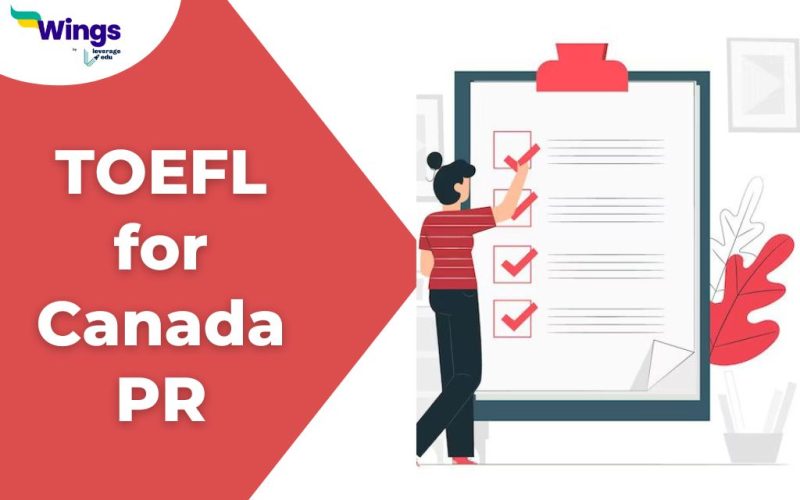As the allure of life in Canada beckons to aspiring immigrants, one indispensable factor in the pursuit of Canadian Permanent Residency (PR) is the demonstration of proficient English language skills. In this endeavor, the Test of English as a Foreign Language (TOEFL) emerges as a crucial stepping stone. The following blog touches on important and useful information regarding the same, make sure to make it till the end!
This Blog Includes:
What is the TOEFL Exam? How Many Sections are there in the TOEFL Exam?
The TOEFL exam is a widely recognized test that measures an individual’s English language proficiency, especially important for Canada PR. It focuses on assessing how well non-native English speakers can understand and communicate effectively in academic settings.
The TOEFL exam comprises four main sections, each aimed at specific language skills:
- Reading: This section evaluates your ability to comprehend written English passages, including grasping the main ideas and answering questions based on the content.
- Listening: As an aspiring immigrant, you’ll need to demonstrate your skill in understanding spoken English in various contexts such as lectures, conversations, and discussions. You’ll be expected to provide accurate responses to questions based on audio content.
- Speaking: This part challenges you to express your thoughts and opinions on different topics. Engaging in conversations, responding to prompts, and delivering brief speeches are key components of this section.
- Writing: The writing component assesses your capacity to create well-structured and coherent responses to prompts. As a prospective immigrant, you should be able to express your viewpoints, support arguments, and communicate effectively in written form.
Must Read: TOEFL Exam 2023: Latest Updates, Format, Registration Process
What is the TOEFL Score Needed to Get Canadian PR?
While the TOEFL indeed plays a significant role in assessing language proficiency, it’s important to note that when pursuing a permanent residency in Canada, TOEFL scores do not have a direct influence. Instead, Canadian immigration authorities exclusively favour the International English Language Testing System (IELTS) General as the preferred test for evaluating English language proficiency in PR applications.
What IELTS Score is Needed to Get Canadian PR?
The minimum IELTS score required for Canadian PR is 6.0 overall, with a minimum score of 6.0 in each of the four language skills: reading, listening, speaking, and writing. This corresponds to a Canadian Language Benchmark (CLB) level 7. The IELTS exam is recognized by the government of Canada for immigration purposes and is one of the accepted English language proficiency tests. To apply for permanent residency through the Express Entry program, candidates need to secure a minimum language proficiency of CLB 7, which translates to an IELTS score of 6.0 in each section.
Express Entry is a points-based system, and candidates need to achieve at least 67 points out of 100 in various eligibility criteria to qualify for the Canada PR visa.
The Express Entry system assesses factors such as age, education, work experience, language proficiency, adaptability, and arranged employment to determine eligibility and rank candidates in the pool. Different immigration programs, such as Federal Skilled Worker Program (FSW), Federal Skilled Trades Program (FST), and Canadian Experience Class (CEC), have specific IELTS score requirements at different CLB levels for each language skill.
Language proficiency is a crucial factor in the Express Entry system, and achieving higher IELTS scores can contribute to a higher Comprehensive Ranking System (CRS) score, increasing the chances of receiving an Invitation to Apply (ITA) for Canadian permanent residency.
Latest Updates Regarding TOEFL
An impressive development is on the horizon, as TOEFL iBT scores find their place within Canada’s Student Direct Stream (SDS) program, a thoughtfully designed initiative by Immigration, Refugees, and Citizenship Canada (IRCC). This innovative program streamlines the processing of study permits for eligible students who are enrolling in designated learning institutions across Canada. Starting from August 10, 2023, students will have the valuable opportunity to seamlessly integrate their TOEFL iBT scores as an essential component of their SDS application. It’s noteworthy that a significant portion of SDS applications is expected to undergo processing within a remarkably short span of 20 calendar days. In addition to TOEFL iBT, the Pearson Test of English Academic (PTE Academic) has also gained approval for inclusion in Canada’s SDS program, thereby offering students a diverse range of options.
Also Read: IELTS vs TOEFL: What are the Differences?
FAQs
No, TOEFL is primarily used for study visas and is not accepted for Canadian PR applications.
Starting from August 10, 2023, students are eligible to include their TOEFL iBT scores in their SDS application.
As per ETS claims, the majority of SDS applications are processed within a span of 20 calendar days, provided applicants meet the eligibility criteria, according to IRCC.
TOEFL for Canada PR, though not directly applicable to PR applications, plays a pivotal role in the broader context of academic pursuits. Armed with a strong TOEFL or IELTS score, you can embark on a journey toward academic excellence, setting the groundwork for a rewarding future in Canada. Build a plan with Leverage Edu‘s Leverage Live classes and our top trainers to strengthen your English score as well as your application so that you can secure your spot in your dream college.


 One app for all your study abroad needs
One app for all your study abroad needs












 60,000+ students trusted us with their dreams. Take the first step today!
60,000+ students trusted us with their dreams. Take the first step today!